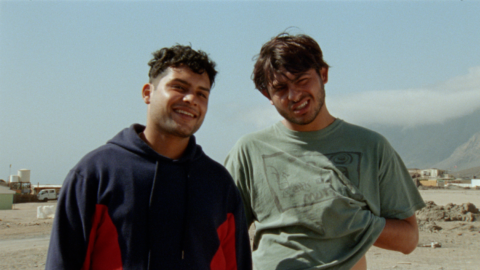Otro Sol’s (Francisco Rodriguez Teare, 2023) tale of international larceny closely interweaves historical with fabricated narratives. Teare’s feature debut taps a familiar well of docu-fiction formalism to interrogate the construction of a distinctly Chilean historiography of thieves living abroad. By leaving the veracity of its central criminal ambiguous, the film recalls Matjaž Ivanišin’s Oroslan (2019) in its fusion of constituent truths into a national mythology.
Two cousins find a retired thief by the Pacific Ocean on the edge of the Atacama Desert. The man, Eugenio Pizarro Pizarro, had allegedly participated in an audacious heist, orchestrated by Alberto Cándia Martinez, in January 1978. The men stole several valuable items, mostly gold, from a cathedral in Cadiz, Spain. The location of these items, as well as Alberto himself, remains a mystery the cousins’ ensuing investigation seeks to uncover.
The film’s non-professional cast is used most effectively in dramatised moments of intimacy. The son and spouse of the disappeared man exude roughshod humanity that bears little interest in appealing to trite notions of liberal sympathy. As for the cousins, the film never quite makes its central duo more than vessels for the film’s thematic ambitions.
Yet Rodriguez shows promise as a keen visualist of landscapes, primarily the remnants they bear of a violent history. Letters from Alberto, read in Italian over shots of roiling waves and forbidding mountains, paradoxically provide the closest and most distant peek into a composite of exiles who fled the ire of Pinochet’s brutal dictatorship.
Otro Sol takes this chapter of Chile’s past as a focal point for the quotidian traces of a colonial legacy. Bookending sequences with a gold miner foreground the challenge to break a greater cycle beset by land extraction and interfamilial violence.
“Gold always means tragedy. Why is that?”, the man asks an unseen figure. It’s a question that cannot be contained in any film. It’s a question that’s pervaded the medium’s history, from Treasure of the Sierra Madre (John Huston, 1948) to Da 5 Bloods (Spike Lee, 2020). Rodriguez, however, doesn’t attempt to definitively answer that question. Rather, he announces his entry into filmmaking with a generative meditation on how its subjects contend with such questions in an ephemeral present.
Nick Kouhi is a programmer and critic based in Minneapolis, Minnesota





